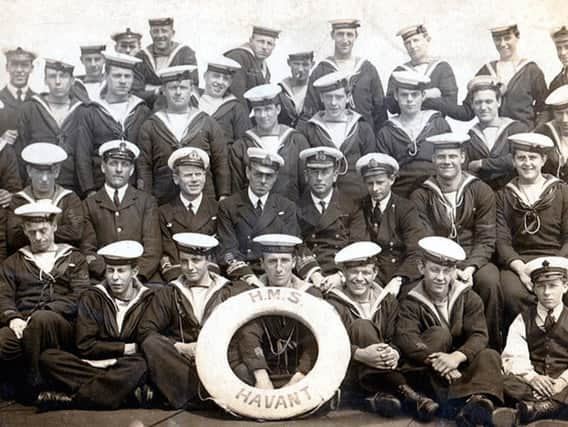Boys who became men when HMS Havant rescued thousands from Dunkirk


Sadly it was sunk by bombs dropped from the Luftwaffe with the loss of eight of the company. Twenty-five soldiers were also killed transferring to another ship. Two of the dead sailors were local men, one an officer the other a chief petty officer. The officer was Lieutenant Ernest Stanley Stribley of Mile End, Portsmouth. The CPO was Herber (possibly Herbert) Percy McBride of Cowes, Isle of Wight.
In the new film Dunkirk a destroyer is shown with the pennant number H32. In reality she is the 1950s' minesweeper MS Sittard of the Netherlands' nav, but she is playing HMS Havant.
Advertisement
Hide AdAdvertisement
Hide AdI have been sent this information and the photograph by an anonymous reader. In the photograph of some of the ship's company I can just about read the sailors' cap tallys and none seems to bear the name HMS Havant. Perhaps they had just been drafted from another ship? Some look just like boys so HMS Havant might have been their first ship.
n Recent events commemorated the disaster that was the Battle of Passchendaele in 1917 during the First World War. Most of the events took place at Tyne Cot Cemetery, the largest military cemetery in the world.
Can you imagine the outcry if, in years to come, the cemetery was flattened, the headstones used as hardcore and a car park built on top of it with the men still interred beneath the Tarmac? I am saddened to report that is exactly what has occurred in Basra, Iraq.
A memorial, inscribed with 40,682 names of men with no known grave who fought in the First World War's Mesopotamian Campaign was unveiled in 1929. It was about five miles from Basra city centre.
Advertisement
Hide AdAdvertisement
Hide AdIn 1997 it was taken apart and moved 20 miles west under the orders of Saddam Hussein. Because it was in a war zone it is believed to have been almost destroyed.
In recent wars in this part of the world many headstones in military cemeteries in the Basra area were destroyed, but in 2003 British forces tried to repair as many as was possible. By 2007 it was too dangerous for the Commonwealth War Graves Commission to send anyone to work in the cemeteries.
The damage is gross: a car park on one and a fairground on another. It is quite heartbreaking to even think about. What military men the world over must think of the situation cannot be fathomed. Not only are there British troops' graves from the two world wars but also Indian and Polish graves.
n I'm glad to say I remember when a footballer being booked was rare. Many will remember '˜Chopper' Harris of Chelsea and Leeds' Norman '˜Bites Yer Legs' Hunter, not to mention Billy Bremner and Nobby Stiles. All were hard men. who, although short, were not averse to dishing it out.
Advertisement
Hide AdAdvertisement
Hide AdIn the opening league matches last Saturday, 10 players were sent off including two at Fratton Park. Most of the referees' decisions would not even have warranted a ticking-off in the past. Some might say those past players were dirty and cheats, others that they just wanted to win and played hard to do so.
I was a goalkeeper and when a corner kick came over nothing would stop me taking the ball. If I was fouled then I just got on with it, but the player had to watch out next time he came near me. I would punch the ball away with one fist while the other went into the back of the player's head who had fouled me. He didn't trouble me again.
Today's TV close-ups of so-called fouls are no more than players bumping into each other, yet we see players rolling in agony trying to get the offending player sent off. That's cheating.
Â